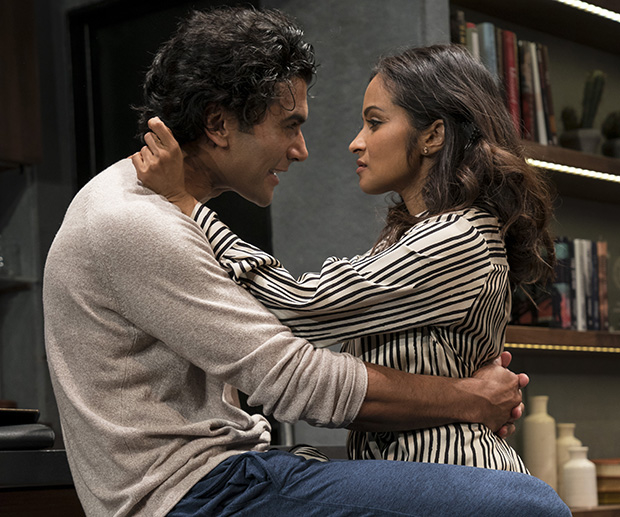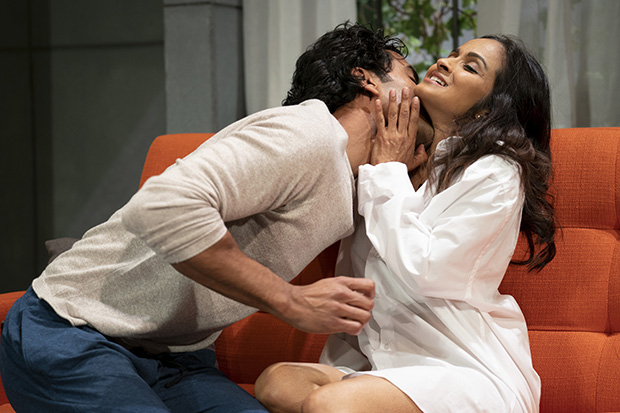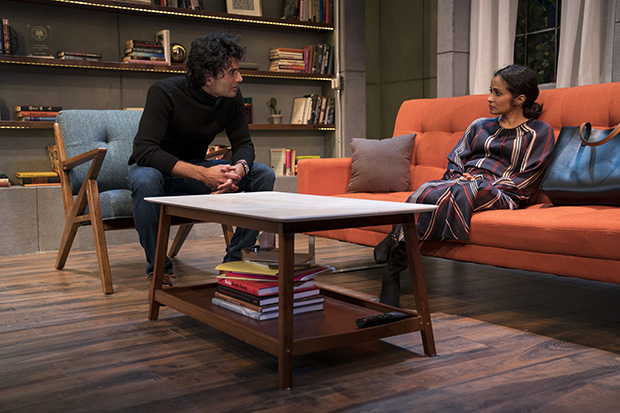Two Beautiful Smart People Fight and Have Sex in Hatef**k

(© Joan Marcus)
Here's an unorthodox dating tip: If you want to show someone you're attracted to them, sneak off to a corner of their home during a party and start snooping through their things. When they catch you, be sure to insult them profusely. That's the tactic employed by Layla Mahdi (a pugnacious Kavi Ladnier) in Rehana Lew Mirza's Hatef**k, now making its world premiere at WP Theater. Surprise: It works!
The object of Layla's derision and desire is Imran Siddiqui (Sendhil Ramamurthy), a best-selling novelist who writes about wild-eyed terrorists and snarling patriarchs under titles like "The Dishonored" and The Savage. A literature professor and a practicing Muslim, Layla thinks his depictions of her coreligionists are offensive and serve only to titillate white Islamophobes. "I bet you have a nice 15-part Twitter screed that will solve all the world's prejudice," he retorts. She then likens his work to a bag of potato chips while comparing his luxurious lifestyle to that of a Moorish warlord. They engage in this linguistic BDSM for some time — until they're finally warmed-up enough for the real thing.

(© Joan Marcus)
As in most romantic relationships, their early encounters are more stimulating. The electric spark between Layla and Imran is fueled equally by attraction and revulsion, creating a magnetic tension that draws us in. Ladnier and Ramamurthy wield Mirza's sharp writing like two Olympic fencers brandishing their foils.
They begin to stumble over their lines, however, as the plot progresses and Mirza becomes bogged down in the play's real purpose: an argument over the representation of Muslims in popular culture. Layla ponders, "But if growing up, if, say, Omar Mateen had seen a complex, gay Muslim man and not a terrorist all the time, could he have been himself, loved himself instead of committing such a terrible act of hate?" This clunky discussion-panel speculation about the motivations of the Pulse nightclub shooter doesn't exactly roll off the tongue, and we occasionally roll our eyes as Imran and Layla make the unsexy transition from flirting in poetry to cohabiting in prose.
Mirza is admirably doing her part to expand the popular perception of Muslims by depicting two Muslim(ish) Americans enjoying a robust, kinky sex life outside of marriage. Even so, Hatef**k takes a familiar form, with two upper-middle-class characters serving as mouthpieces in a pressing debate. Their deliberation becomes increasingly tedious, especially as these two professional writers start talking about book deals and television options. It's the most boring kind of inside baseball.

(© Joan Marcus)
The play is half-salvaged by Adrienne Campbell-Holt's steamy staging, which emphasizes the raw sexuality of the two performers. Intimacy director Judi Lewis Ockler brings order and specific detail to their natural chemistry. Set designer Anshuman Bhatia has created a stylishly modern habitat for sexytime, with single malt scotch occupying the highest shelf of Imran's handsome bar. Barbara Samuels lights the space with nightclub-ready LEDs between scenes, propelling the transitions forward with the beat of Joanna Lynne Staub's sound design. Sarita Fellows's form-flattering costumes are just a few shades of gray shy of 50, and wouldn't look out of place in a singles bar. "You look like a newly unemployed i-banker," Layla critiques Imran's open-collar burgundy shirt and blue jeans getup, and we totally understand what she means.
Mirza has some important observations about the tension between the popular and the pure in art. Unfortunately, they are not presented compellingly enough in Hatef**k to get anyone truly hot and bothered.










